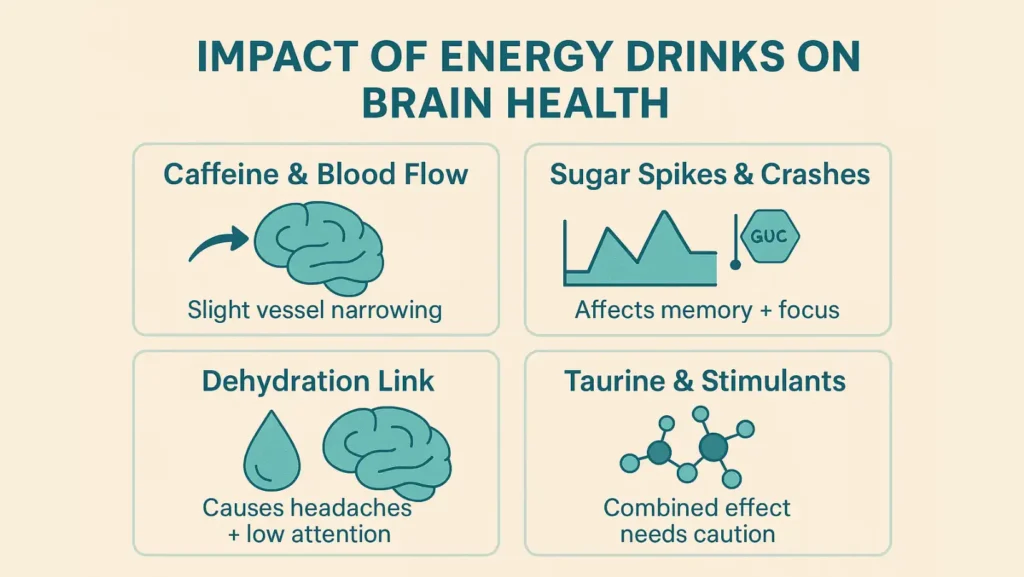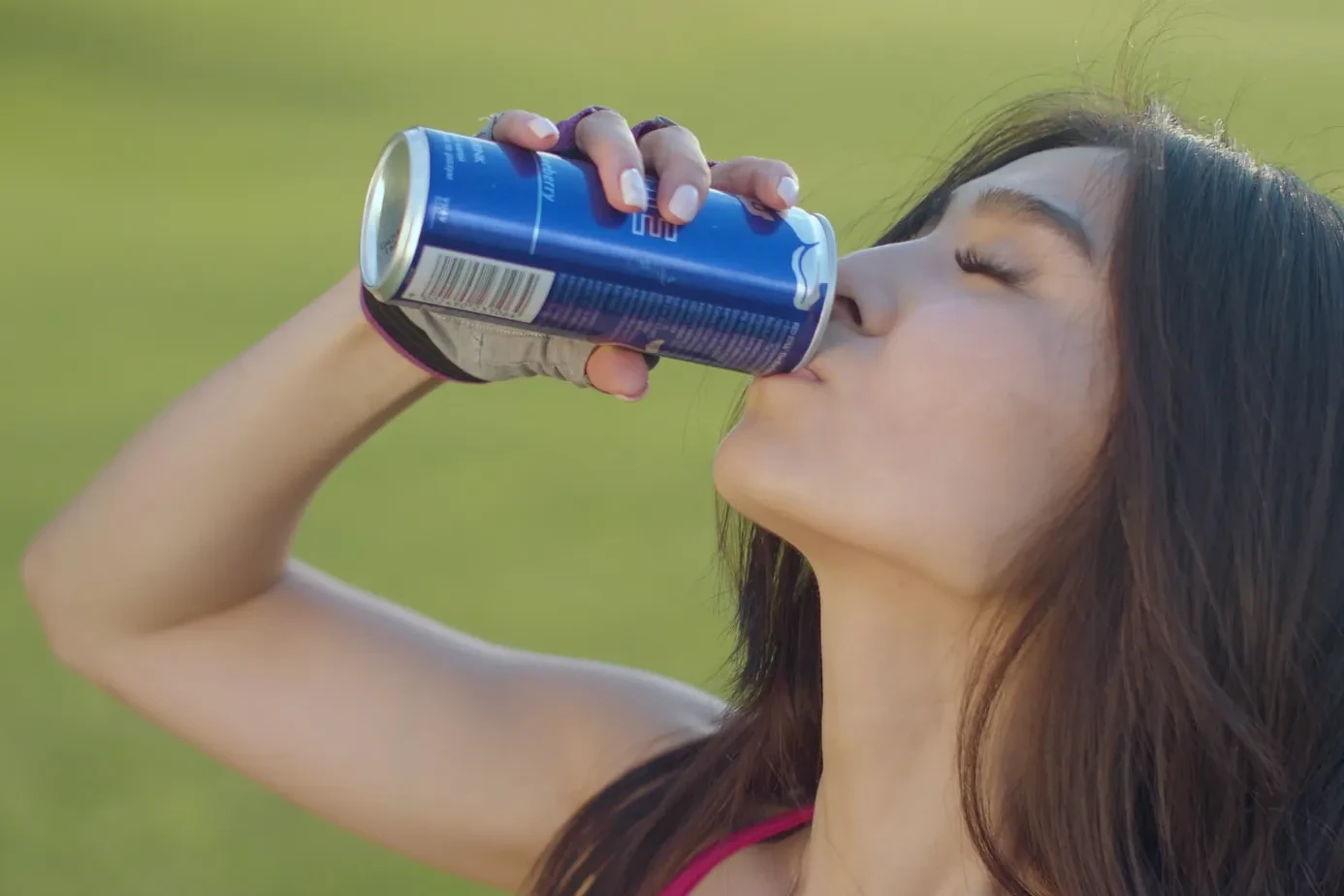The effects of energy drinks on the brain are immediate and lasting. You feel more awake and sharper after a drink. You may also face anxiety, sleep loss, mood swings, and learning trouble. Teens face higher risks. These drinks mix caffeine, sugar, and other stimulants.
Together, they push brain signals to run faster. That change can help with short tasks. It can harm long-term brain health when you use them often. Trusted experts warn about these risks.
Table of Contents
ToggleWhat Do Energy Drinks Do To The Brain?
When you drink an energy drink, caffeine reaches your brain quickly. Caffeine blocks adenosine receptors (adenosine makes you sleepy). Blocking these receptors keeps you alert. You also get a rise in dopamine.
Dopamine boosts reward and focus. Sugar gives a fast fuel spike. This spike makes your energy feel higher. Then the blood sugar drops. That crash makes you tired and moody. Other additives change brain signals further. Taurine and herbal stimulants amplify effects. Some combinations may exceed safe doses.
How Caffeine Interacts With Brain Neurotransmitters
Caffeine blocks adenosine. This stops sleep signals. Caffeine also boosts dopamine signaling. Dopamine affects motivation and reward. You feel more driven and alert.
Over time, your brain adjusts. You need more caffeine to get the same effect. That leads to dependency. In youth, this rewiring can affect learning and mood. Keep intake low to avoid changes.
Short-Term Boost: Alertness, Energy, And Focus
You will notice a faster reaction time after one drink. Studying or driving may feel easier for a few hours. Teams and athletes may use small doses for performance. The boost fades. After the effect ends, you can feel tired. That crash may reduce focus and mood.
How Sugar And Additives Affect Brain Chemistry
High sugar pushes blood glucose high. The brain uses glucose fast. When levels fall, you feel low and foggy. Additives like taurine act on brain cells. Some may help in tiny amounts.
But combined with caffeine, they can boost heart rate. That increases anxiety and jitteriness in some people. Labels do not always list exact amounts. You cannot judge safety by taste or look.
Caffeine And Brain Function
Caffeine affects two main systems. It blocks adenosine and alters dopamine. These two together produce wakefulness and better attention. Caffeine also narrows blood vessels in the brain. For most people, this change is small. For people with heart or brain disease, it may matter. Limits exist to protect you.
The Role Of Adenosine And Dopamine In Stimulation
Adenosine tells your brain to rest. Dopamine rewards actions with pleasure. Caffeine stops adenosine from working. This keeps you awake.
At the same time, caffeine helps dopamine signals. You feel more motivated. If you use caffeine often, these systems adapt. You may feel less pleasure without it.
Energy Drink Caffeine Levels Versus Safe Daily Limits
Adults should keep caffeine under 400 mg daily. Pregnant people should limit to 200 mg. Teens should stay under 100 mg. Some energy drinks give 200 mg in one serving. That exceeds teen limits.
You can quickly pass safe limits if you drink more than one can or mix with coffee. Labels help, but are not always clear. Follow age-based limits.
Signs Of Caffeine Overuse And Dependency
You may feel frequent headaches, irritability, or a need for more caffeine. Sleep trouble is common. You may feel shaky or anxious after use. If you struggle to stop, you may be dependent. Withdrawal brings headache and low energy. Cut down slowly to avoid severe symptoms.
Immediate Effects On Brain And Mood
Increased Alertness And Improved Concentration
You will likely notice better focus for an hour or two. Short tasks benefit most. Simple learning or tests can seem easier. This is why people use these drinks before studies or workouts.
Energy Drink–Induced Anxiety And Jitteriness
High doses can make you nervous. Your heartbeat can feel fast. You may sweat or shake. People with anxiety disorders may experience worse. If you feel panic after one drink, avoid more.
Why Energy Drinks Can Trigger Restlessness Or Insomnia
Caffeine can stay in your body for six hours or more. Late-day drinks can prevent sleep. Reduced sleep makes the next day harder. You may then rely on more drinks. This cycle harms brain recovery.
Effects On Memory And Learning Ability
A short caffeine dose may sharpen attention. But poor sleep from caffeine harms memory. Repeated use that cuts sleep can harm classroom learning. Teens who drink often may show worse school performance.
Impact Of Energy Drinks On Brain Health
Caffeine’s Effect On Blood Flow And Brain Oxygenation
Caffeine narrows cerebral blood vessels. That lowers local blood flow slightly. For healthy adults, the effects are tolerable. For those with stroke or heart risks, this may be harmful. Chronic intense use could add stress to the brain circulation.
How Sugar Spikes And Crashes Affect Brain Performance
Sugar gives fast fuel but short endurance. Frequent spikes and crashes hurt steady thinking. Over months, poor glucose control can harm brain cells. This affects memory and decision-making.
Energy Drinks And Dehydration: The Hidden Link
Caffeine increases urine output mildly. If you do not drink water, you risk dehydration. Dehydration reduces attention and causes headaches. Water before and after high caffeine drinks helps.
Role Of Taurine And Other Stimulants On Brain Function
Taurine affects brain and heart cells. Alone, it may not be harmful. In combination with caffeine, it can alter heart rhythm. Long-term brain effects remain under study. Use caution with heavy daily use.
Energy Drinks And Mental Health
Connection Between Energy Drink Use And Anxiety
Studies link heavy energy drink use with higher anxiety levels. Teens are most affected. Reducing intake lowers anxiety for many people. Seek help if symptoms persist.
Energy Drinks And Depressive Symptoms
Frequent use tied to depression in some studies. The link may go both ways. People with depression may drink more. Drinking heavily may worsen mood cycles. Monitor changes in your mood.
Link To Stress, Irritability, And Poor Emotional Regulation
After the high, the crash can make you irritable. Repeated crashes lower stress tolerance. You may react badly to small problems. This damages relationships and focus.
How Frequent Use Alters Dopamine And Serotonin Balance
Regular stimulant use modifies reward circuits. Dopamine and serotonin change over time. Natural rewards may feel less satisfying. You may need stimulants to feel normal.
Brain Inflammation And Long-Term Damage
Can Energy Drinks Trigger Brain Inflammation?
Animal studies and some human studies show markers of inflammation after chronic use. The blood-brain barrier may weaken. This may let harmful substances reach the brain. Evidence grows but is not yet final. Take care with daily heavy use.
Oxidative Stress Caused By Excess Caffeine And Sugar
Too much caffeine and sugar raise oxidative stress. Oxidative stress damages cells over time. This can speed brain aging and harm memory. A healthy diet and low use reduce this risk.
Potential Long-Term Risks To Cognitive Performance
Long-term heavy use may harm attention and memory. Animal models show cell damage. Human studies show links to poor outcomes. Protect your brain by limiting daily intake.
Research On Chronic Energy Drink Consumption And Brain Aging
Emerging studies tie long-term intake to markers of brain aging. These include inflammation and DNA damage in some models. The safest path is limitation, especially for young people.
Energy Drinks And Brain Development Risks
Why Adolescents And Young Adults Are Most Vulnerable
Teen brains form key circuits for learning and emotion. Stimulants can disturb synapse growth. Sleep loss during adolescence further harms development. Young people should avoid energy drinks.
Impact On Developing Brain Cells And Synaptic Plasticity
Early exposure can change how synapses form. Synaptic plasticity means the brain’s ability to adapt. Disrupting this can impair learning and memory later.
Effect Of Early Caffeine Exposure On Focus And Sleep Patterns
Children who start caffeine early often show lasting sleep problems. Poor sleep reduces concentration. These changes make school harder and affect mood. Parents should limit access.
How Energy Drinks Affect Sleep And Recovery
How Caffeine Delays Melatonin And REM Sleep Cycles
Caffeine reduces melatonin release. Melatonin tells your body to sleep. It also reduces REM sleep time. REM sleep helps memory and mood. Loss of REM harms learning.
Brain Fatigue And The Illusion Of Energy
Energy drinks mask tiredness. They let you work past rest needs. This forces the brain to miss repair time. Pushing past fatigue leads to worse performance later.
How Poor Sleep Amplifies Anxiety And Mental Fatigue
Less sleep raises stress and anxiety. You will feel less patient. Mental fatigue grows. This feeds a loop of more caffeine use.
Safe Consumption And Healthier Alternatives
Ideal Caffeine Intake Limits For Brain Health
Adults: under 400 mg daily. Teens: under 100 mg daily. Children: avoid caffeine. Pregnant people: keep under 200 mg. Stick to these numbers to protect sleep and mood.
Low-Caffeine And Natural Alternatives To Energy Drinks
Green tea gives mild caffeine and antioxidants. Water with fruit keeps you hydrated. Small meals with protein and whole grains provide steady fuel. Short brisk walks help boost energy without a crash.
Best Drinks For Sustained Mental Energy Without Crash
Choose water, tea, or milk. Snack on nuts or yogurt. Avoid sugary drinks for long tasks. These choices support steady focus.
Lifestyle Habits That Improve Brain Focus Naturally
Sleep enough nightly. Exercise regularly. Eat balanced meals. Take short study breaks. These habits build energy and brain health.
Signs Energy Drinks Are Affecting Your Brain
Frequent Headaches Or Brain Fog
Headaches and fog can mean overuse. Lower intake and drink water. See a doctor if symptoms stay.
Feeling Jittery, Anxious, Or Unable To Concentrate
Jitters and anxiety often follow high doses. Cut back gradually to reduce symptoms.
Sleep Disturbance Or Chronic Fatigue
If sleep suffers, cut caffeine. Better sleep restores mood and memory.
Mood Swings Or Irritability After Drinking Energy Beverages
If you get mood swings after a drink, the drink may cause brain chemical shifts. Stop and observe.
When To Seek Medical Help
Persistent Anxiety, Insomnia, Or Mental Fog
If these last for weeks, see a doctor. You may need help to wean off stimulants.
Symptoms Of Caffeine Withdrawal Or Overdose
Severe headache, vomiting, chest pain, or fainting requires urgent care. Call emergency services if needed.
Evaluation For Neurological Side Effects
Seizures, fainting, or severe weakness need immediate medical attention. Energy drinks can trigger these rare events in some people.
FAQs
Can Energy Drinks Cause Brain Inflammation?
Yes. Studies show chronic heavy intake can raise brain inflammation markers and affect blood-brain barrier function in animal and some human studies. Avoid daily heavy use.
How Does Caffeine Affect Brain Function?
Caffeine blocks adenosine, raising alertness. It affects dopamine, too. These changes boost focus short-term but can harm sleep, mood, and learning if used heavily.
Are Energy Drinks Linked To Mental Health Problems?
Yes. Heavy use links to higher anxiety and depressive symptoms in adolescents and adults. The relation may be two-way. Reducing intake often helps mood.
Do Energy Drinks Affect Focus And Memory?
Short-term focus can improve with caffeine. Long-term, sleep loss from these drinks harms memory and learning. Young brains are especially at risk from heavy use.
What Happens To The Brain After Long-Term Use?
Long-term heavy use may increase inflammation, oxidative stress, and signs of brain aging. Memory and attention may decline. Research continues, but risks are real.
Can Energy Drinks Damage A Teenager’s Brain?
Yes. Teen brains are developing and are vulnerable. Early or heavy exposure can harm sleep, learning, and emotional control. Parents should limit access.
How Can I Reduce Energy Drink Dependency Safely?
Cut back slowly. Replace drinks with tea or water. Improve sleep and nutrition. Seek medical help if you have severe withdrawal symptoms.
What Are Healthy Alternatives For Mental Alertness?
Sleep well, hydrate, eat balanced snacks, and move briefly. Green tea gives mild caffeine without a big crash. These options boost focus safely.
About The Author

Medically reviewed by Dr. Chandril Chugh, MD, DM (Neurology)
Board-Certified Neurologist
Dr. Chandril Chugh is a U.S.-trained, board-certified neurologist with expertise in diagnosing and managing neurological disorders, including migraines, epilepsy, Parkinson’s disease, and movement disorders. His clinical focus includes evidence-based neurological care and patient education.
All content is reviewed for medical accuracy and aligned with current neurological guidelines.





